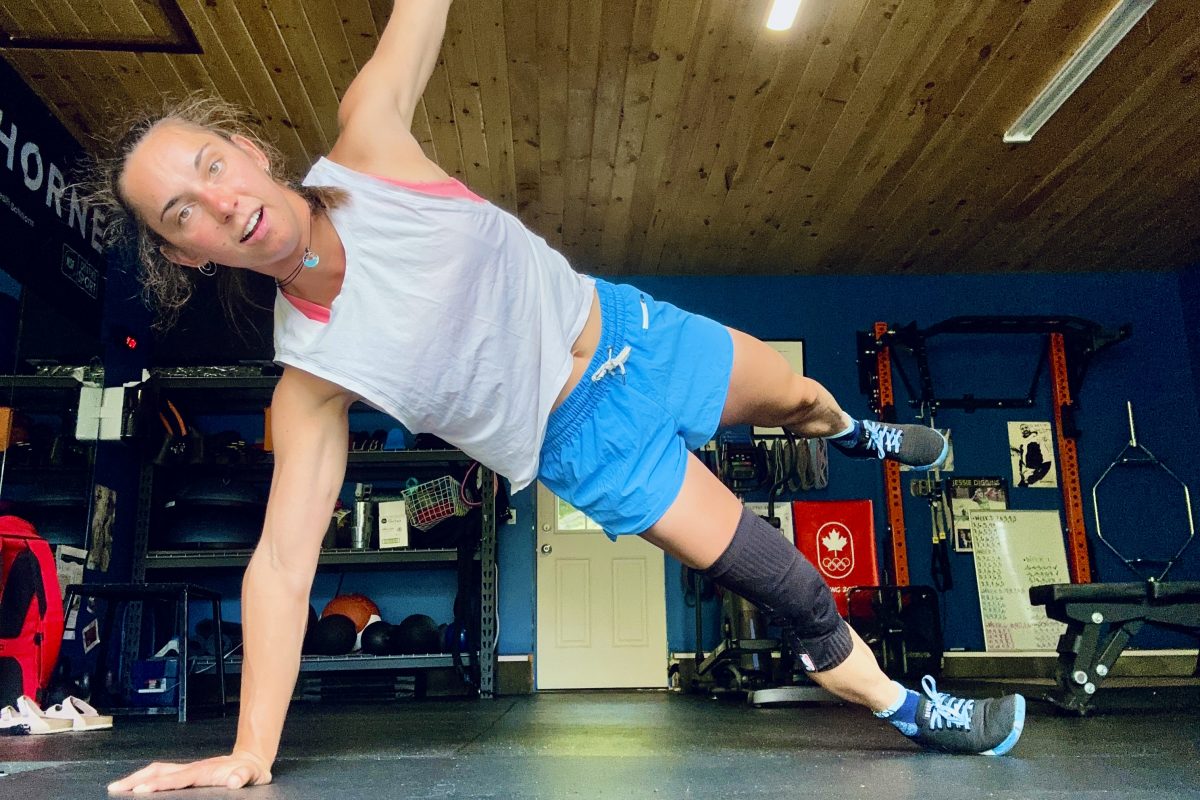Brian Gregg is a member of the CXC Team Vertical Limit. Equipment Sponsors: Salomon skis/boots/bindings, Toko Wax, Polar Heart Rate Monitor, Swix Poles, Rudy Project Eyewear/Helmet, Marwe Rollerskis, Nordic Ultratune Stonegrinding.
Interval, strength and distance training are all good ways to improve, so why not do each every day? Training stresses the body and breaks it down which makes us weaker or tired. We actually become more fit, faster and stronger by allowing ourselves to recover and our cells to rebuild stronger. Recovery is what allows an athlete to improve physically.
Since recovery is such an integral part of training, it is important to plan for it. Recovery doesn’t have to be just when the training effort is over, plan for recovery before, during and after your workout. Incorporate recovery techniques into your everyday routine and utilize them throughout the day.
15 Way to Help Recover
The human body does a great job of recovering on its own. However, there are a number of things you can do that can speed along your recovery and get you feeling great and ready to work hard again.
Stretching
In addition to improving flexibility and range of motion stretching helps blood flow to your muscles. When you stretch you make small tears in your muscles similar to a hard training session. For this reason I recommend stretching on easier days.

Rolling
Using your own body weight to massage soft tissue can work well to release tension and improve flexibility. Myofascial release is a great way to recover. Foam rollers come in a variety of firmness, start with a softer roller and work towards a firmer one. An alternative is to use a PVC pipe or rolling pin. Additionally a tennis ball works well to roll the sides of the hip.
Ice
Icing your muscles is a wonderful way to reduce inflammation. The cold constricts the blood vessels and when they warm up again it helps to flush your system and remove toxins. An ice pack works well and a cold lake works even better.

Ibupropen
Trusty ‘Vitamin I’ works as an anti-inflammatory and can reduce muscle soreness. Beware of overuse though as the drug can be hard on the stomach.
Sleep
The simplest and greatest way to recover is with a good nights rest. This is the body’s natural recovery method both physically and mentally. Additionally a short 10-20 minute nap can do wonders.
Massage
A light ‘feel good’ massage will relax you but a deep tissue sports massage will really loosen you up and help your cells rebuild. Massage can be expensive but by the end of a session you know it is worth it.
Mental
Give yourself a break from training/skiing. Many great athletes operate best under a healthy balance of training, work, friends and family. Focus on training when training and then relax between workouts. You can still think about recovery but do other things to help keep the mind fresh and happy. Studies have proven that a happy person is less likely to get sick and recovers more quickly.
Diet
Have a light snack and/or recovery drink within 20 minutes of finishing your workout and try to eat a full meal within an hour. Include carbohydrates to replace the fuel you have burned as well as some protein to help your cells rebuild.
Active Recovery
An easy walk, jog or spin on the bike is a great way to get the blood flowing. Get out with your friends, family and pets and move around.
Hydrate
The human body is 70-80% water and hydration has a strong correlation to performance. Hydrate well before, during, and after a workout. It can be fascinating to weigh yourself before and after a workout on a hot day to really realize how much water weight you can lose during exercise. Use an electrolyte or sports drink to help replenish your carbohydrate stores simultaneously, particularly during longer workouts. Remember that when you are thirsty you are already dehydrated.
Hot Tub/Sauna
A good soak/sweat can help relax your body allowing you to sleep better. Take advantage of your muscles being warm and stretch them out.
Leg Drain/Head Stand
Relax and put your feet up, preferable above your heart. Reversing blood flow for several minutes helps remove toxins.
Shower
A warm shower feels great. Keep your body clean and relaxed. Aroma therapy can go a long ways so invest in some good body wash and shampoo.
Dry Clothes
Make it easy for your body to stay a comfortable temperature. Dress appropriately when working out and change into try clothes immediately when the workout is complete.
Cleanliness
Keep your room and home clean. There is a reason why your workouts clothes smell, bacteria. Hang them to dry as soon as you finish your workout, preferably not in your bedroom where you spend most of your time.
Recover All Day
There are a number of activities that can be done every day to aid recovery. Remember that you can recover all day long. Stretch while you are waiting in line, carry a water bottle and drink a sip often.
Plan for Recovery
An athlete needs to balance recovery at a micro level with hard days and easy days, as well as at a macro level with hard weeks and easy weeks. Most professional athletes take a mandatory rest day every week or every ten days. Taking two rest days in a row can really help to recharge your system. Your body needs time to absorb the hard efforts. Make sure you let your hard work pay off.
There are a lot of fun adventures to be had and don’t be afraid to go hard, but remember to take it easy every once in a while. It will actually make you faster.




10 comments
edgarhee
September 15, 2009 at 3:57 pm
Ibupropen can be more than hard on the stomach. A combination of dehydration, ibupropen and fatigue could lead to renal failure as happened to this year’s Where’s Waldo foot race.
http://www.mailtribune.com/apps/pbcs.dll/article?AID=/20090902/NEWS/909020322#STS=fzn4dp8y.gcj
An Ashland ultra-marathoner who fell gravely ill after winning the 100-kilometer Where’s Waldo race east of Eugene faces another daunting challenge: $25,000 to $30,000 in medical bills.
Erik Skaggs, 27, spent six days in local hospitals recovering from acute renal failure, apparently caused by a combination of dehydration and taking ibuprofen after a demanding race….
Skaggs won the 62-mile race Aug. 22 in nine hours, 11 minutes, smashing the USA Track & Field national championship course record by more than 56 minutes.
fastrcp
September 15, 2009 at 8:59 pm
Brian, great advice–except for the Ibuprofen. Vitamin I? Long term use of Ibuprofen has many serious side-effect. Here’s a good link to check out– http://www.drugs.com/pro/ibuprofen.html
Here’s another link– http://www.askdocweb.com/ibuprofen.html
Kidney failure would be one of the side-effects. Did you ever wonder why you hear of professional athletes that have kidney transplants? There are a lot of natural supplements that help reduce inflamation in the body, that don’t cause harm. My wife Megan Ping is a Chiropractor and CXC Master’s Team Member in Winona, MN and would gladly help you. Before meeting her, I was on the advice of an athletic trainer at my college and taking lots of Ibuprofen–Thank God, for Megan! I don’t take a single medication, I’m on the 550 per week training plan. I do take plenty of high quality, natural nutritional supplements.
jenmygatt
September 15, 2009 at 9:24 pm
Brian – great article; thanks.
Edgarhee, I want to respond to your ibuprofen commentary. Scary stuff for sure, and certainly probably true. However, I would ask some more questions before I decide to stop taking ibuprofen for sore muscles. How extreme was the athlete’s dehydration? And how much ibuprofen did he consume in his 100k race? And how was his health/fitness during and prior to this race?
A 100k race is a brutal endeavor that few of us every push through, and it puts huge demands on the body. Obviously. My understanding is that it’s normal to need IV fluids after ultras, and that it’s not unheard of to have blood in the urine during the races, due to the walls of an empty bladder smacking against each other with every step. Please correct me if I’m wrong…
Acute renal failure is caused by inflammation and ischemia (not enough blood flow). Dehydration leads to reduced blood volume, which can lead to decreased blood pressure and ischemia. Simply competing in an ultra, due to volume depletion, could lead to ischemia. Perhaps in this vulnerable state, the ibuprofen pushed Skaggs into renal failure?
I quickly checked out some of the medical literature available on PubMed. Here is what I learned:
*Ibuprofen can be associated with acute renal failure in newborns.
*Older adults, and individuals with decreased renal perfusion (translation: not enough blood gets to the kidneys… kidneys need a lot of blood to function properly!) are at risk for kidney problems with long-term ibuprofen use.
* The only thing I found about athletes, ibuprofen, and renal failure was the case of one 20-year old woman who’d taken ibuprofen for many months for minor sports injuries, who went into chronic renal failure. Nothing about endurance athletes or acute renal failure.
So the take home message for me is to:
1, stay hydrated, which strikes me as among the most important of Brian’s suggestions,
2, take ibuprofen when necessary for muscle soreness due to hard training or minor injury, and
3, if I put myself in a situation where I’m jeopardizing my renal function through extreme dehydration, then hold off on the ibuprofen.
edgarhee
September 16, 2009 at 10:15 am
Yes, the 100K Where’s Waldo race is an extreme event. Staying hydrated during extreme events is not always possible. Hammer Nutrition’s Steve Born says that the body does not absorb as much as can be lost:
http://www.hammernutrition.com/za/HNT?PAGE=ARTICLE&ARTICLE.ID=299&OMI=&AMI=&RETURN_URL=%2Fza%2FHNT%3FPAGE%3DTRAININGTIPS%26OMI%3D%26AMI%3D&RETURN_TEXT=Performance+Tips
Needless to say, maintaining optimal fluid intake prior to and during exercise is crucial for both performance and health. However, as is true with calories and electrolytes, you can’t replenish them at the same rate you deplete them; your body simply won’t absorb as fast as it loses….
Brian Gregg
September 16, 2009 at 6:35 pm
Thanks for the comments. I am happy to see that readers are recognizing potential health concers and sharing them. This is much better than commenting on the fact that I spelled ibuprofen wrong. It saddens me to hear about Erik Skaggs health issues. I am curious to know more about his dosages and use of ibuprofen. Here are some of my thoughts on Ibuprofen.
Personally, I am very anti-drug, although I will admit that I do take Ibuprofen 2-3 times per year if I am feeling particularly sore. This is part of a recovery plan that I have developed with the help of various professionals. Before others attempt to mirror the plan (with regards to ibuprofen) I would recommend that they speak with a health care provider and are aware of proper use of the drug.
The comments above prompted me to talk more to my doctor about Ibuprofen use. He agreed that long-term regular use and overuse have been known to cause GI and Kidney issues, however, occasional use should be just fine. Occasional use being defined as a few times per month and less than 1000mg/day
As with any drug there are always risks and side effects. For muscle and joint soreness relief, ibuprofen seems to have less risks than other drugs such as acetaminophen (Tylenol).
FastRCP, I would like to talk with you and Megan about different natural nutrional supplements. I am always looking to learn more.
Thanks for engaging my mind on the use of ‘Vitamin I’ (yes, I know it is not a vitamin)
Sven
September 16, 2009 at 10:20 pm
For what it’s worth, I have some perspective as a physician who has taken care of people with side effects from NSAID use. Just this last weekend I had a patient in the emergency department with a GI bleed because he was pounding excessive doses of ibuprofen throughout the Lotoja cycling race (208 miles from Logan, Utah to Jackson Hole, WY). I have also taken care of athletes with NSAID-induced renal failure. This is my advice: For MOST normal healthy people, it is safe to take 800mg of Ibuprofen at a time, but never more than every 8 hours. I don’t recommend taking this amount for more than a few days. Always stay hydrated, and don’t take on an empty stomach. If you are a normal healthy person and you follow this advice, you will probably will stay out of trouble.
nordic_dave
September 17, 2009 at 9:54 am
Thanks Brian good article! I think Dr. “Sven” addressed the Ibuprofens adequately for those that went crazy on this and probably what Brian meant all along in summary fashion. I think you can die from drinking too much water yet moderation is the key.
A few other thoughts. I think you are pointing that it is hard to know when to stop as many are training hard right now for the upcoming season whether it’s to make the second wave of the Birkie or the Olympics, people are getting after it and it’s easy to over do it without resting because they think being tough is critical and otherwise one would be showing a mental weakness. As one mentor coach said to me “dare yourself to rest”.
A few other random tricks to recovery:
A friend and I raced Lapponia Ski Week in Finland last April.
3 races in 5 days a 60k , 50k and 80k. The races were part of the Euroloppet Series with cash prizes so it was no Tour across Finland type of event, people were getting after it all 3 days.
First when done racing, change and leave to recover somewhere. Soo many people to just hang around at the finish socializing not realizing they aren’t helping themselves for the day after. It is obviously fine to socialize and if this was your only event or big event for the season well then go ahead yet if you have many races over a season it’s best to scram.
Second: They make recovery drinks that target what the body and muscles need. Heck taking a tour of the Center of Excellence for the U.S Ski Team, it’s amazing what those physiologists are doing in concocting special recovery drinks with basic ingredients available to anyone.
Third: A day before a race I will typically stretch it out in a hotel swimming pool but not jump in the hot tub. It is also a great way to recover to just kicking around easy for 20 minutes after a race. At Laponnia my day off was 20 minutes in a cool swimming pool. Next day, race day I was not tired and ready to go again.
Fourth: I have tendonitas in my gastroc’s and solius, i.e. too many laps on a hard track years ago. I have found infrared heat to be incredible for making muscles more supple as well as literally zapping lactic acids away. They make infrared sauna’s, heat domes, heat lamps, etc.. So the price range is anywhere from $200 to $12,000 depending on what you want. I chose a $700 heat dome that works great for me.
Thanks again for the article Greg.
nordic_dave
September 17, 2009 at 12:39 pm
Oops sorry Brian! Not Greg.
kmd
October 12, 2009 at 2:49 pm
Love the suggestion about keeping one’s room clean. Anyway this could be highlighted and shared with junior racers?
skier1
January 11, 2010 at 11:33 pm
Do not take ibuprofen unnecessarily, such as for muscle soreness. Only take it if you have an acute, necessary reason to reduce inflammation, and then only take it once or twice in combination with other methods of inflammation reduction. If you are tempted to take it any more than that, get medical help for the injury. For chronic repetitive not-really-injury situations, come up with other methods. Taking ibuprofen for those reasons is destructive more than it is helpful. Even if you do not cause renal failure, the stuff isn’t exactly good for your organs. Western medicine does not seem to care about or detect (even with testing) small or moderate amounts of organ damage, but why mess with that unnecessarily.